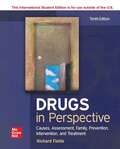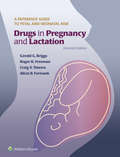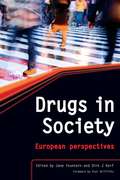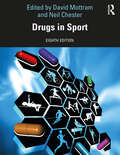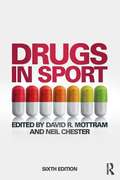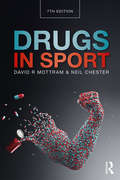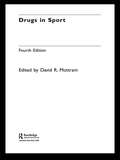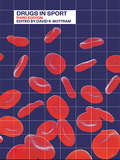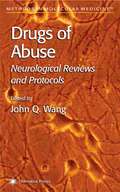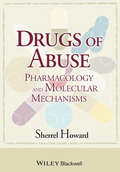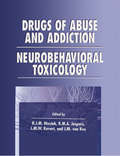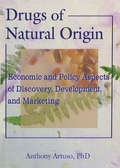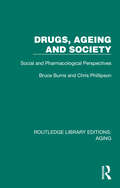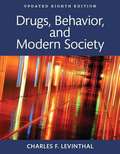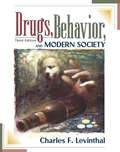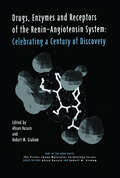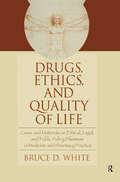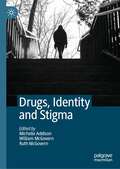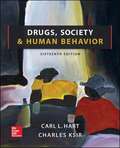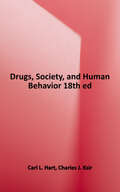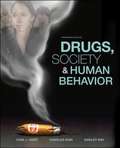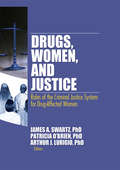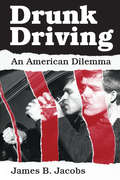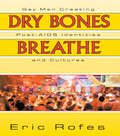- Table View
- List View
Drugs in Perspective: Causes, assessment, family, prevention, intervention, and treatment
by Richard FieldsDrugs in Perspective examines the rapidly changing field of chemical dependency with an emphasis on family dynamics, the impact of family on individuals, and their use of alcohol/drugs. Students will gain a full understanding of the dynamics of chemical dependency and the domino effects that can have on someone's life. Students will also foster and develop an effective perspective on the multifaceted aspects and problems associated with alcohol/drug use, abuse, and addiction. Richard Fields has 30 years of first-hand experience performing clinical work with substance abuse users and their families, and he relays his experience and research in such a way that is approachable and engaging for students. The tenth edition of Drugs in Perspective boasts a new section on Medical Marijuana and a new section on Mindfulness Education in England. Both of these sections were added to reflect current research and discussions in the field.
Drugs in Pregnancy and Lactation: A Reference Guide To Fetal And Neonatal Risk (Solution (lippincott Williams And Wilkins) Ser.)
by Gerald G. Briggs Roger K. Freeman Craig V. Towers Alicia B. ForinashPut essential information at your fingertips – before you prescribe. The updated 11th edition of Drugs in Pregnancy and Lactation: A Reference Guide to Fetal and Neonatal Risk lists more than 1,200 commonly prescribed drugs taken during pregnancy and lactation, with detailed monographs that provide the information you need on known or possible effects on the mother, embryo, fetus, and nursing infant. For the 11th edition, this bestselling reference has two new authors, both highly knowledgeable on the effects of drugs on the embryo-fetus and nursing infant: Craig V. Towers, a maternal-fetal medicine specialist, and Alicia B. Forinash, a clinical pharmacologist specialist in obstetrics.
Drugs in Society: The Epidemiologically Based Needs Assessment Reviews, Vols 1 & 2
by Jane Fountain David Elliman Dirk J KorfThis title includes Foreword by Paul Griffiths, Scientific Coordinator, European Monitoring Centre for Drugs and Drug Addiction (EMCDDA), Portugal. "Provocative. Stimulating. Reflect[s] the diverse and eclectic nature of drug use in Europe and, in doing so, makes for a rich reading experience. This book is about drug use as a dynamic social behaviour where understanding meaning and motivations, and culture and context, are as important as understanding the actions of chemicals on the brain or body. It clearly illustrates the value of social research as a powerful tool for illuminating subjects that are too often overlooked in the discourse on the drug problem, but also reminds us why such a detailed vision is important." "If you are feeling jaded and uninspired, and have forgotten why this topic ever interested you in the first place; if you simply want to read something provocative and different that reminds you of why the use of drugs is not only an important policy issue but also a fascinating area for social research - this book is for you - and these seem to me pretty good reasons for recommending a text." - Paul Griffiths, in the Foreword.
Drugs in Sport
by David MottramDrugs in Sport is the most comprehensive and accurate text on the emotive, complex and critical subject of performance enhancement and doping within sport. Thoroughly updated in light of the latest World Anti-Doping Code and taking into account the latest regulations, procedures and landmark cases, this 8th edition explores the science behind drug use in sport, as well as its ethical, social, political and administrative context. Introducing an increased focus on athletes with specific needs and on corrupt doping practices, the book covers key topics including: - an evaluation of the prevalence of doping in sport; - the latest doping control regulations stipulated by the World Anti-Doping Agency (WADA); - the science and side effects of each major class of drug used in sport; - cutting-edge issues such as drug use by transgender athletes; - medical and anti-doping considerations for athletes with an impairment; - governance and corruption in sport including institutionalised doping; - issues surrounding sport nutrition and supplement use in sport; - medical and pharmaceutical services at major sporting events. Accessibly written, and supported throughout with illustrative case studies and data, Drugs in Sport provides a crucial and objective resource for students and researchers, athletes, sports scientists, coaches and athlete-support staff, journalists, sports administrators and policymakers, alike.
Drugs in Sport
by David R. Mottram Neil ChesterDrug use and abuse is perhaps the biggest challenge facing sport today. However, in the eye of the storm of public and press opinion and with medals and morals at stake, it can be difficult to gain a clear perspective on this complex issue. Now available in a fully updated and revised sixth edition Drugs in Sport is the most comprehensive and accurate text available on the subject. Taking into account the latest regulations, methods and landmark cases, the book explores the hard science behind drug use in sport as well as the ethical, social, political and administrative context. Key topics include: Mode of action and side effects of each major class of drugs used in sport Discussion of cutting-edge issues such as gene doping and athlete biological passports The latest doping control regulations of the World Anti-Doping Agency (WADA) Issues surrounding non-prohibited substances and ergogenic aids in supplements Medical and pharmaceutical services at major sporting events An assessment of the prevalence of drug taking in sport Accessibly written, extensively referenced, and supported throughout with illustrative case studies and data, Drugs in Sport provides a comprehensive, objective resource for students and researchers, athletes, sports scientists and coaches, journalists, sports administrators and policymakers.
Drugs in Sport
by David R. Mottram Neil ChesterDrugs in Sport is the most comprehensive and accurate text on the emotive, complex and critical subject of doping and illegal performance enhancement in sport. Thoroughly updated in light of the latest World Anti-Doping Code and taking into account the latest regulations, methods and landmark cases, this seventh edition explores the science behind drug-use in sport, as well as its ethical, social, political and administrative context. Introducing an increased focus on inadvertent doping, athlete-support personnel as key stakeholders in the doping process, societal drug-use, and the role of national governing bodies and anti-doping organisations, the book covers key topics including: an assessment of the prevalence of drug-taking in sport the latest doping control regulations stipulated by the World Anti-Doping Agency (WADA) the science and side effects of each major class of drug used in sport cutting-edge issues such as gene doping and biological passports issues surrounding legal substances and ergogenic aids in supplements medical and pharmaceutical services at major sporting events Accessibly written, and supported throughout with illustrative case studies and data, Drugs in Sport provides a crucial and objective resource for students and researchers, athletes, sports scientists, coaches and athlete-support staff, journalists, sports administrators and policymakers, alike.
Drugs in Sport (4th Edition)
by David R. MottramWith the recent major updates in worldwide anti-doping laws and changes to the prohibited and therapeutic exemption lists, this fourth edition of the bestselling Drugs in Sport presents authoritative, hard science information about the actions of drugs, hormones, medication and nutritional supplements in sport. Written by a well respected pharmacologist from one of the UK's leading sports science universities, this much-needed new edition of a market leader continues to focus on one of the most high profile themes in sport science, providing high quality detailed information. Some of the key issues covered include: *the latest doping control regulations of the WADA *the use of therapeutic drugs banned in sport *an assessment of the prevalence of drug taking in sport.
Drugs in Sport (Third Edition)
by David MottramDrug use and abuse represents perhaps the most profound and high-profile issue facing sport today. Each major international championship seems to deliver a new drug-related controversy, while drug takers and sports administrators attempt to out-manoeuvre each other with new substances and new testing procedures.Drugs in Sport - 3rd Editionis a fully revised and updated version of the most comprehensive and authoritative text available on the subject. Leading figures in the field explore the hard science behind every major class of drug, as well as the social, ethical and organisational dimensions to the issue.Key topics include:* analysis of all the key substances, including anabolic steroids, EPO and human growth hormone* alcohol and social drug use in sport* creatine and nutritional supplements* evidence and issues around doping control in sport.This is a highly accessible text for all sports science and sports studies students, coaches and professional sports people, and sports administrators and policy-makers.
Drugs of Abuse
by John Q. WangA cutting-edge collection of updated and core techniques for the neurological study of drugs of abuse. Described in step-by-step detail by hands-on experts, these readily reproducible protocols cover a wide variety of coherent methods for gathering information on quantitative changes in protein and mRNA at both tissue and cellular levels. There are various methods for detecting single and multiple alterations in single and multiple gene expression, for analyzing the functional roles of genes and proteins, for studying the release kinetics of striatal dopamine, and for the quantitative measurement of such neurotransmitters as acetylcholine. Insightful review articles address key current topics on the effect of drugs of abuse on the brain.
Drugs of Abuse
by Sherrel HowardDrug abuse has been, and continues to be, a global societal issue with diverse sets of impacts. Drugs of Abuse: Pharmacology and Molecular Mechanisms introduces the basic principles of pharmacology and neuroscience of drug abuse. Understanding the chemistry of commonly abused drugs and their impact on brain function will provide students and researchers with a more profound understanding of the molecular basis of drug abuse and addiction.Drugs of Abuse: Pharmacology and Molecular Mechanisms opens with a brief history of drug use and abuse. Subsequent sections look at specific families of drugs, including stimulants, depressants, and hallucinogens among others, and explore how their chemical make-up interacts with brain function. The final chapter provides a brief overview of clinical substance abuse treatment.Providing a concise, accessible introductory overview of the topic, Drugs of Abuse: Pharmacology and Molecular Mechanisms will be a valuable resource for students, researchers, and others interested in how drugs interact with the brain.Introduces readers to the basic principles of neuroscience and pharmacology as related to drug use and abuse. Explores how the chemical make-up of drugs interact with the brain and can lead to addictionIncludes coverage of a wide array of commonly abused families of drugs, including stimulants, depressants, hallucinogens, and others.Provides an essential introduction to the chemical and molecular underpinnings of drug use and abuse
Drugs of Abuse and Addiction: Neurobehavioral Toxicology
by R J.M. Niesink R.M.A. Jaspers,Drugs of Abuse and Addiction: Neurobehavioral Toxicology examines drugs of abuse and addiction and how they affect behavior. This book considers the entire range of addiction research in humans and animals, using a multidisciplinary approach to discuss all areas of the neuro- and behavioral sciences involved. Emphasis is on acute and chronic effect
Drugs of Natural Origin: Economic and Policy Aspects of Discovery, Development, and Marketing
by Anthony ArtusoDespite the growing interest in biodiversity as a source of valuable new products and biochemical information, there have been very few systematic efforts to estimate the value of preserving biological resources for this purpose. Drugs of Natural Origin gives you a detailed model of the value of wild biological resources for pharmaceutical research and development. Author Anthony Artuso presents several decision models and analytical techniques that you can use to assess the economics of biochemical prospecting efforts whether you’re part of a private corporation, nonprofit research institute, developing country government, or international organization.Drugs of Natural Origin explores the policy options available to developing countries and international organizations to tap into the emerging market for biological resources in such a way as to provide both incentives for conservation of biodiversity and new opportunities for economic development. You’ll find evaluations of a range of proactive strategies that can be used to protect and enhance developing countries’biological resources. In addition, you’ll learn about a bioeconomic model that incorporates the potential biochemical and genetic value of a diverse ecosystem into land use planning and development.Developing country and international policymakers will find Drugs of Natural Origin a useful tool for determining how best to conserve biodiversity, while sustainably developing biological resources. This book outlines a comprehensive and integrated set of policy measures, research and development initiatives, and financing arrangements that could increase biochemical research activity while providing incentives for conservation of biodiversity and a potential path for sustainable development.Managers of pharmaceutical R&D programs will use the decision models developed in Drugs of Natural Origin to plan, evaluate, and continually refine their R&D programs. The book’s theoretic framework provides you with an analytical tool for systematically evaluating critical decisions at each stage of the R&D process. Thus, you learn to incorporate both subjective assessments and quantitative data into a comprehensive framework for R&D decisionmaking.
Drugs, Addiction, And The Law: Policy, Politics, And Public Health
by Peter J. CohenAmerican physician and attorney Cohen discusses legal, ethical, and policy considerations faced by society as it deals with psychoactive drug use. A recurring theme is the need to balance individual liberty and autonomy with the needs of society. None of the several models that have been devised to that end is completely satisfying, he says, and all of them raise important questions. The book cites legislation and court decisions extensively.
Drugs, Ageing and Society: Social and Pharmacological Perspectives (Routledge Library Editions: Aging)
by Chris Phillipson Bruce BurnsDuring the 1970s and 1980s prescription and over-the-counter drugs had come to play a major role in the health care of older people. Originally published in 1986, this book reviews the historical background to this development and explores its social and pharmacological implications. The main aim of the study was to provide a critical perspective on drug use together with a framework for developing effective prescribing policies. The authors do not, in developing their arguments, reject the enormous value of drugs in the treatment of many illnesses affecting older people; they do, however, criticise excessive as well as inappropriate prescribing. The intention was to provide some practical illustrations of how the harmful effects of drug use can be curtailed. This book was aimed, in particular, at workers in the health services, for example: doctors, health visitors, district nurses, pharmacists, the professions allied to medicine. However, it should also be of interest to other groups such as social workers, carers, support groups and older people themselves.
Drugs, Behavior, And Modern Society
by Charles LevinthalThe eighth edition of Drugs, Behavior, and Modern Society examines the impact of drug-taking behavior on our society and our daily lives. The use and abuse of a wide range of licit and illicit drugs are discussed from historical, biological, psychological, and sociological perspectives. In today's world, drugs and their use present a social paradox, combining the potential for good and for bad. As a society and as individuals, we can be the beneficiaries of drugs or their victims. This text features a comprehensive review of psychoactive drugs, and is notable for the attention it gives to two aspects of drug-taking behavior that have been underreported in other texts: steroid abuse and inhalant abuse.
Drugs, Behavior, and Modern Society (3rd Edition)
by Charles F. LevinthalAn introduction to many of the controversies related to drug use and abuse with a focus on health and prevention.
Drugs, Enzymes and Receptors of the Renin-Angiotensin System: Celebrating a Century of Discovery
by Ahsan Husain Robert M. GrahamSince 1898, when Tigerstadt and Bergman first extracted renin from rabbit kidney, the reninrugs, Enzymes and Receptors of the Renin is designed to highlight molecular and clinical approaches to understanding the reninChapter topics have been specifically chosen to cover selected contemporary, controversial and unresolved issues. A novel and uni
Drugs, Ethics, and Quality of Life: Cases and Materials on Ethical, Legal, and Public Policy Dilemmas in Medicine and Pharmacy Practice
by Bruce D. WhiteWeigh pivotal healthcare ethics, law, and public policy issues that resulted in tipping-point legal actionsWeighing the ethical considerations in healthcare and drug issues can be emotionally difficult and mentally challenging. Drugs, Ethics, and Quality of Life: Cases and Materials on Ethical, Legal, and Public Policy Dilemmas in Medicine and Pharmacy Practice is a fascinating casebook that clearly discusses the most contentious ethical conflicts that resulted in legal actions. This easy-to-read text provides all sides of controversial real-life cases that provoke spirited debate while teaching the fundamentals of pharmacy law and ethics. The book is a unique exploration into the basic principles of bioethics, end of life care, and drug research. Drugs, Ethics, and Quality of Life explains in detail the concepts of ethics, quality of life, beneficence, nonmaleficence, autonomy, and justice. Recent cases provide illuminating backdrops for the exploration of these concepts, making them easily understood. A special introduction includes important information about ethics and the pharmaceutical code of ethics. Two appendixes provide further opportunities for discussion and the examination of law and decisions, and resources about drug use decisions and situations. This thought-provoking textbook plainly shows the crucial role ethics plays in today&’s society. Ethical topics explored in Drugs, Ethics, and Quality of Life includes legal cases on: tobacco COX-2 inhibitors medical marijuana the "morning after" pill and other emergency contraceptives pain medications and palliative care drugs physician-assisted suicide drug use in medically futile situations gene therapy Drugs, Ethics, and Quality of Life is valuable, insightful reading as well as a good adjunct text for pharmacy students, pharmacists, medical students, physicians, bio
Drugs, Identity and Stigma
by Michelle Addison Ruth McGovern William McGovernThis book calls attention to the impact of stigma experienced by people who use illicit drugs. Stigma is powerful: it can do untold harm to a person and place with longstanding effects. Through an exploration of themes of inequality, power, and feeling ‘out of place’ in neoliberal times, this collection focuses on how stigma is negotiated, resisted and absorbed by people who use drugs. How does stigma get under the skin? Drawing on a range of theoretical frameworks and empirical data, this book draws attention to the damaging effects stigma can have on identity, recovery, mental health, desistance from crime, and social inclusion. By connecting drug use, stigma and identity, the authors in this collection share insights into the everyday experiences of people who use drugs and add to debate focused on an agenda for social justice in drug use policy and practice.
Drugs, Society and Human Behavior
by Charles Ksir Carl HartDrugs, Society and Human Behavior provides the latest information on drug use and its effects on society as well as on the individual. Trusted for more than 40 years by both instructors and students, this authoritative resource examines drugs and drug use from a variety of perspectives--behavioral, pharmacological, historical, social, legal, and clinical. The 16th edition includes the very latest information and statistics and many new timely topics and issues have been added that are sure to pique students' interest and stimulate class discussion.
Drugs, Society and Human Behavior
by Carl L. Hart Charles KsirThis book provides the latest information on drug use and its effects on society and individuals. Trusted for more than 45 years by both instructors and students, this authoritative resource examines drugs and drug use from a variety of perspectives–behavioral, pharmacological, historical, social, legal, and clinical. The 18th Edition includes the latest information and statistics on drug use trends, treatments, and drug-related mortality.
Drugs, Society, and Human Behavior (13th edition)
by Carl L. Hart Charles Ksir Oakley RayDesigned for the introduction to drugs and substance abuse course as taught in departments of health education, psychology, biology, sociology, and criminal justice, this full-color market-leading text provides the latest information on drugs and their effects on society and human behavior.
Drugs, Women, and Justice: Roles of the Criminal Justice System for Drug-Affected Women
by Arthur J. Lurigio James A. Swartz Patricia O’BrienA unique interdisciplinary exploration of a pressing social issueThe numbers of women offenders involved in the correctional system are quickly growing. Drugs, Women, and Justice: Roles of the Criminal Justice System for Drug-Affected Women gathers a distinguished group of researchers and policy analysts into one volume to explore the broad social and individual implications of current policy and practice pertaining to women in the criminal justice system. This valuable resource provides readers with a superb overview of the current state of knowledge and provides recommendations for new directions. Each top-notch chapter was originally presented at the 2005 Drugs, Women, and Justice Symposium, held on the University of Illinois at Chicago campus and sponsored by the Jane Addams College of Social Work Substance Abuse Research Collaboration through a grant from the National Institute on Drug Abuse.Traditionally, criminal justice studies and rehabilitation programs have focused on male offenders. Recent studies reinforce the current evidence that females should have their needs addressed differently. This unique book presents the latest research and thinking in complex and still emerging areas of policy and treatment for women in the criminal justice system.Topics in Drugs, Women, and Justice: Roles of the Criminal Justice System for Drug-Affected Women include: characteristics of drug-involved women in the criminal justice system the negative impact on families of punitive drug laws and child welfare legislation assessing and managing the service needs of children whose mothers have been arrested influences of feelings of isolation on the course of rehabilitation demographic differences between women in drug treatment and drug-involved women in the criminal justice system service needs of women released from prison a program developed for women who have survived traumatic violence, working in the street economy, and the criminal justice system the direct and indirect impact of mass incarceration on women and more Drugs, Women, and Justice: Roles of the Criminal Justice System for Drug-Affected Women is essential reading for researchers, criminologists, sociologists, social workers, psychologists, clinicians, feminists, and policymakers in the areas of social welfare, criminal justice, and drug policy.
Drunk Driving: An American Dilemma
by James B. JacobsIn this ambitious interdisciplinary study, James B. Jacobs provides the first comprehensive review and analysis of America's drunk driving problem and of America's anti-drunk driving policies and jurisprudence. In a clear and accessible style, he considers what has been learned, what is being done, and what constitutional limits exist to the control and enforcement of drunk driving.
Dry Bones Breathe: Gay Men Creating Post-AIDS Identities and Cultures
by Eric RofesDry Bones Breathe: Gay Men Creating Post-AIDS Identities and Cultures breaks new ground in offering an original and insightful interpretation of gay men’s shifting experience of the AIDS epidemic. From Dry Bones Breathe, you’ll gain a deeper understanding of current community debates focused on circuit parties, unprotected sex, and gay men’s sexual cultures, and you will learn how social, political, and biomedical changes are dramatically transforming gay identities and cultures.Dry Bones Breathe is Eric Rofes’explosive follow-up to Reviving the Tribe, a book which broke open debates in gay communities around the world about sex, identity, and gay men’s relationship to AIDS. In this volume, Rofes contends that most gay men no longer experience AIDS as the crisis they did during the 1980s. Gay men often attribute this shift to the advent of protozoa inhibitors, but Rofes explains how other factors, including the epidemic’s predicted trajectory, new treatments for opportunistic infections, the passage of time, and the increasing diversity of gay men inhabiting communities throughout the country have set in motion the transformation of gay life. AIDS organizations and gay leaders, however, continue to assert that gay men experience AIDS as an emergency, resulting in a tremendous dissonance between gay leaders and their communities. In the midst of this controversy, Dry Bones Breathe lets you share in stories of hope and recovery and a new vision for AIDS work that demands a radical redesign of prevention, care, and activism. Dry Bones Breathe tackles several other issues concerning the powerful shifts occurring in gay communities and cultures by: explaining why an understanding of the terms “post-AIDS” and “post-crisis” is crucial to interpreting contemporary gay male cultures and what Australian prevention theorists have to offer gay men in the United States describing the “Protozoa Moment” and exploring how a dangerous obsession with pharmaceuticals is leading many to mistakenly attribute all changes in gay men’s cultures to combination therapies examining the writings of Larry Kramer, Andrew Sullivan, Michelangelo Signorile, and Gabriel Rightly to illustrate how the crisis construct has unleashed a backlash against gay sexual cultures discussing the dramatic diminution in gay men’s AIDS-related deaths in epicenter cities and the impact of shrinking obituary pages on gay men’s mental health exploring the diverse relationships to the epidemic forged by young gay men, gay men of color, gay men from rural or small towns, and middle-aged men not infected with HI detailing how HI prevention and service organizations targeting gay men must redesign their mission and restructure their work In response to continuing efforts to direct gay men back into a state of emergency, Dry Bones Breathe suggests that long-term prevention efforts must be constructed around something other than a crisis. While AIDS organizations look at gay men’s diminished participation in AIDS activism, Rofes argues that these organizations should face how they have distanced themselves from the reality of most gay men’s lives. From stories and experiences full of hope, anger, sadness, and strength, Dry Bones Breathe will teach you about gay men who no longer base their identities and cultures solely around AIDS.
